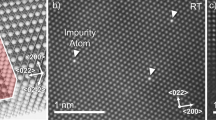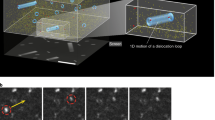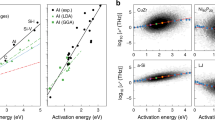Abstract
IN non-cubic crystals the rate of self-diffusion can be expected to depend on the crystallographic direction parallel to which the diffusion is measured. Although the determination of this anisotropy is of interest for the theory of diffusion, experiments have so far only been carried out on bismuth1 and zinc2 crystals. The measurements made on zinc are not of high accuracy and their evaluation is open to doubt. The relation between the diffusion coefficient measured in a direction at an angle 0 to the principal axis and the diffusion coefficients parallel (Dc) and at right angles (Dα) to this axis is .
This is a preview of subscription content, access via your institution
Access options
Subscribe to this journal
Receive 51 print issues and online access
$199.00 per year
only $3.90 per issue
Buy this article
- Purchase on Springer Link
- Instant access to full article PDF
Prices may be subject to local taxes which are calculated during checkout
Similar content being viewed by others
References
Seith, W., Z. Elektrochem., 39, 538 (1933).
Miller, P. H., and Banks, F. R., Phys. Rev., 61, 648 (1942).
Huntington, H. B., Phys. Rev., 61, 325 (1942).
Author information
Authors and Affiliations
Rights and permissions
About this article
Cite this article
BOAS, W., FENSHAM, P. Rate of Self-Diffusion in Tin Crystals. Nature 164, 1127–1128 (1949). https://doi.org/10.1038/1641127b0
Issue Date:
DOI: https://doi.org/10.1038/1641127b0
This article is cited by
-
Degradation-resistant TiO2@Sn anodes for high-capacity lithium-ion batteries
Journal of Materials Science (2021)
-
Creep deformation behavior of Sn–Zn solder alloys
Journal of Materials Science (2014)
-
Dynamic Recrystallization (DRX) as the Mechanism for Sn Whisker Development. Part I: A Model
Journal of Electronic Materials (2009)
Comments
By submitting a comment you agree to abide by our Terms and Community Guidelines. If you find something abusive or that does not comply with our terms or guidelines please flag it as inappropriate.



